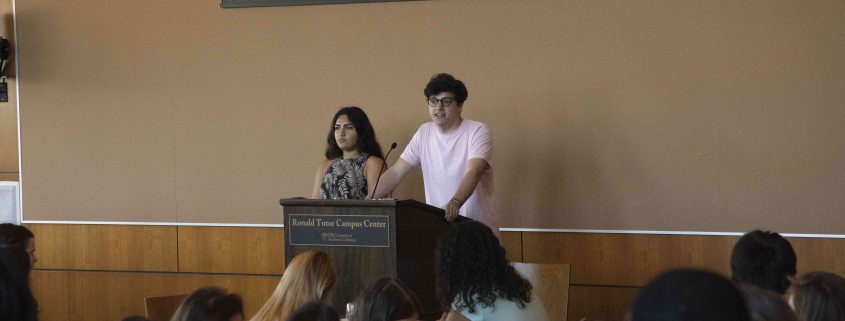Forum discusses goals for 2028 campus sustainability efforts

Environmental Student Assembly co-executive directors Claire Mauss and Nathaniel Hyman opened the annual sustainability forum by commenting on the increased turnout at the event compared to past years. (Ben Butcher | Daily Trojan)
Over 100 people were in attendance for the environmental forum on Wednesday hosted by the Environmental Student Assembly and the Office of Sustainability to discuss green efforts implemented by the University and future endeavors.
The forum discussed the 2020 Sustainability Plan, which focused on water, waste, transportation and engagement efforts. The presenters also focused on future sustainability efforts to be implemented on the Row and zero-waste tailgating, composting and recycling across campus.
Ellen Dux, the associate director for the Office of Sustainability, also discussed the University’s future goals with its 2028 sustainability plan to continue the agenda established in 2020 but on a more “aggressive” scale. The goals for sustainability efforts are still being formulated.
“We want to be moving to where our city is going, if not even faster than where our city is going,” Dux said. “In these early stages, nothing is off the table. Anybody who’s interested in what’s happening with sustainability in this campus has a way to have their opinion.”
Isabella Caltabiano and Lauren Pearson, the director and assistant director of the Undergraduate Student Government’s Sustainability Affairs, presented USG’s sustainability efforts, including getting more compost and recycling bins in student and Greek life housing.
Sustainability Affairs also plans to invite a new vendor to McCarthy Quad farmer’s markets that would offer free refills of shampoo, laundry detergent, conditioner and various other beauty and hygiene products.
“This would be purchasing a reusable bottle once and then when you’re done with your shampoo, being able to go to these refill stations and just keeping that same exact bottle, so you would never have to continuously throw out your recyclable bottles,” Pearson said.
One audience member brought up concern with fossil fuel endowments — specifically investments made by college administrations to fossil fuels instead of clean energy efforts. Dux said the University’s 2028 Sustainability Plan will not concern itself with this effort, but that various groups are working on addressing this.
Julia Desantis, a sophomore studying communications, was concerned with how the question was addressed during the forum and whether this will have an effect on the transparency of administrative funds and sustainability efforts in the future.
“It kind of contradicts the whole idea of being sustainable … Especially if the tone of the campaign is transparency and collaboration, I think it’s definitely something that needs to be on the table,” Desantis said.
The forum also discussed the results from the 2020 planning survey. Only 519 responses were recorded from students, staff, faculty, and alumni with 63% of those surveyed displaying interest in sustainability efforts on campus, but most were not aware of current initiatives on campus.
President Carol Folt’s inauguration, which advertised a zero-waste initiative that essentially meant diverting at minimum 90% of waste from landfills, produced in total a 95% diversion at HSC overall. The University hopes to continue these efforts in future projects, such as through the zero-waste tailgate initiative.
The tailgate initiative plans to divert the 7 to 15 tons of average landfill waste created by implementing compost and recycling bins in some closed tailgates with student ambassadors to educate those attending. This initiative started at a previous tailgate and will be implemented again at the Homecoming game. The Office of Sustainability hopes to expand the effort to the entire campus in the future.
The goals for the 2028 Sustainability Plan are set to be completed and sent for administrative approval by early next year,
The Sustainability Steering Committee, comprised of students, faculty and staff will create these goals, which are still being formulated but is set to be released to administrative officials early next year.

